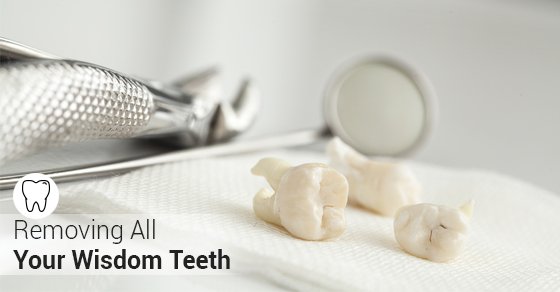Wisdom teeth removal is a common procedure that offers many benefits to dental patients. Impacted or crowded wisdom teeth lead to secondary issues that affect the function and look of your smile.

Most people typically develop four wisdom teeth; if you’re curious about timing, learn more about when wisdom teeth come in. Doctors may advise patients to have all of their wisdom teeth removed. But do all of your wisdom teeth have to be removed?
Understanding the procedure that is used to remove wisdom teeth and consulting with your dentist will provide you with the information you need to make the right choice.
Common Issues Related to Wisdom Teeth
A routine dental exam can help you determine if there are any issues related to your wisdom teeth. There are cases where a person may not experience pain from their wisdom teeth however this doesn’t mean that there aren’t issues that need to be addressed.
The following are the most common reasons why wisdom teeth are removed:
- Inflammation of the gums
- Cavities
- Damage to the jaw or surrounding teeth
- Alignment issues
Removing Your Wisdom Teeth
There are many factors that determine if all of your wisdom teeth have to be removed. Your health, age and other dental needs are just a few of the things that you need to consider. Consulting with your dentist should be the first step in the process. You’ll have an opportunity to have your questions answered and evaluate your current needs.
Your doctor can also provide recommendations to prepare for a wisdom teeth removal and the subsequent recovery period. Having the position of your teeth evaluated will indicate how many wisdom teeth need to be removed.
The shape and size of your mouth, along with any existing symptoms, such as inflammation or swelling, also influence the extent of the procedure that you’ll need.
A wisdom teeth removal procedure is a common and effective way to eliminate dental issues. It can provide relief from discomfort and prevent costly issues in the future.